|
Have a safe day!
Monday, March 31
10 a.m.
P5 Virtual Town Hall Meeting - Curia II
2 p.m.
Particle Astrophysics Seminar - Curia II
Speaker: Erin Sheldon, Brookhaven National Laboratory
Title: Weak Gravitational Lensing of Galaxy Clusters
3:30 p.m.
DIRECTOR'S COFFEE BREAK - 2nd Flr X-Over
4 p.m.
All Experimenters' Meeting - Curia II
Tuesday, April 1
11 a.m.
Academic Lecture Series - One West
Speaker: Wolfgang Altmannshofer, Perimeter Institute
Title: Origins of Electric Dipole Moments
3:30 p.m.
DIRECTOR'S COFFEE BREAK - 2nd Flr X-Over
THERE WILL BE NO ACCELERATOR PHYSICS AND TECHNOLOGY SEMINAR THIS WEEK
Click here for NALCAL,
a weekly calendar with links to additional information.
Ongoing and upcoming conferences at Fermilab
|
|
Monday, March 31
- Breakfast: eggs benedict
- Breakfast: sausage, egg and cheese croissant
- Sloppy joe
- Smart cuisine: teriyaki pork stir fry
- Chicken curry
- Italian antipasto panino
- Italian pasta bar
- Vegetarian cream of spinach
- Texas-style chili
- Assorted pizza by the slice
Wilson Hall Cafe menu
|
|
Wednesday, April 2
Lunch
- Northern Italian lasagna
- Caesar salad
- Italian cream cake
Friday, April 4
Dinner
Closed
Chez Leon menu
Call x3524 to make your reservation.
|
|
Particle physics in the United States
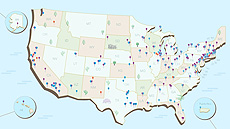 |
More than 150 U.S. universities and laboratories are engaged in particle physics research and technology innovation, playing important roles in the Higgs boson and cosmic inflation discoveries — and the many more revelations still to come. Image: Sandbox Studio |
Particle physics research in the United States is a distributed effort involving researchers across the country. In 2013, more than 150 universities and laboratories in 43 states (plus Washington, D.C., and Puerto Rico) received funding from the Department of Energy and the National Science Foundation to explore the nature of matter, energy, space and time.
DOE's national laboratories serve as hubs of innovation, places where scientists and engineers from around the country — and from around the globe — come together to develop technologies and tools, build unique instruments and machines, and run complex experiments.
Together with scientists and students from universities across the country and around the world, this web of researchers is revolutionizing our view of the universe, making significant advances in how we understand, predict and ultimately control matter and energy while training the next generation of scientists. They create tools and applications that help other fields of science and improve the nation's health, wealth and security.
View a poster highlighting U.S. universities and laboratories engaged in particle physics.
|
Reflecting on winter
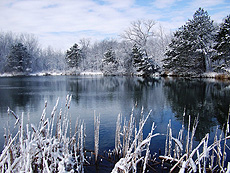 |
| We say goodbye both to the beauty and the perseverance of this recent winter. Photo: Dave Giese, Fermilab Natural Areas |
|
Steve Webster retires today
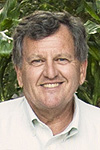 |
|
Steve Webster
|
After more than 30 years serving the Department of Energy, Steve Webster is retiring. His last day is today.
Steve started his career with DOE in 1984 in Columbus, Ohio, working on the National Waste Terminal Storage Program. Originally a mining engineer, he later moved to Argonne National Laboratory to work for the DOE Repository Technology Program. In the 1990s Steve worked for the DOE's growing Environmental Management Program. In 2005, he moved to the Fermi Site Office.
Steve's responsibilities at Fermilab focused on infrastructure management, site stewardship and project management. He was heavily involved in the NuMI/MINOS effort and more recently the NOvA project.
Steve has made many valuable contributions to DOE and Fermilab, but he will be missed especially for his reliability, amicable disposition and friendship.
—Mark Bollinger, Fermi Site Office
|
Space heater care and maintenance
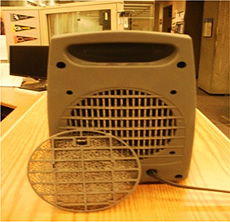 |
Be safe: Take proper care of your space heater. |
Your space heater has taken care of you through some long cold winter days. Now is the time for you to take care of it so it continues to serve you well.
Inspect: Check the outside case, including the bottom, for deformation or discoloration. Make sure the cord and plug are undamaged.
Maintain: Newer space heaters from the stockroom have removable filters. Do not operate these heaters without the filter in place. These filters should be cleaned at least annually. Clean by rinsing the filter in clean water and air-drying thoroughly before reinstalling.
Operate and observe: Run the heater, noting any unusual noise or odor. Check the airflow. If the heater element is clogged with lint, this may cause the heater to overheat or shut down. Do not attempt to clean or service a heater that does not have a removable filter.
Store or replace: Unplug heaters and store for the next winter season in a dry location. If a heater is discolored, distorted, damaged, or exhibits unusual noises, odors or low airflow, it should be removed from service, discarded and replaced with the stockroom model next winter.
—Dave Mertz, electrical safety officer
|
The fourth transformation of neutrinos
From Interactions.org, March 25, 2014
The OPERA international experiment at the INFN Gran Sasso Laboratory (Italy) has detected a fourth tau neutrino. The neutrino indeed started its flight at CERN as muon neutrino and, after travelling 730 km through the Earth, it arrived at the Gran Sasso laboratory transformed into a tau neutrino.
This important result was announced today during a seminar held at the Gran Sasso Laboratory.
Read more
|
|
Sustainable buildings
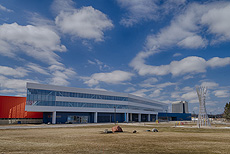 |
| Fermilab's IARC Office, Technology and Education Building is nearing completion and will eventually be certified as a LEED building. Among many innovative features of the building is geothermal heating and cooling. Photo: Reidar Hahn |
Last week, the Grid Computing Center (GCC) became the first Fermilab building to attain 100 percent of the Guiding Principles for High Performance and Sustainable Buildings, a federal mandate to dramatically increase the efficiency and sustainability of federally owned buildings.
GCC is a 16,000-square-foot data center and uses an enormous amount of energy — more than 1,000 times that of the average American home. But this achievement shows that even using large amounts of electricity to crunch scientific data can be done efficiently. GCC has also earned the U.S. Environmental Protection Agency's Energy Star certification for the fourth year in a row, which means that it operates more efficiently than 75 percent of comparable buildings in the country.
The government's interest in making buildings more efficient and sustainable is evidenced by abundant guidance and mandates, including two executive orders signed by Presidents Bush and Obama. According to the EPA, buildings consume 65 percent of the electricity and around 40 percent of the total energy produced in the United States. Energy efficiency is a cornerstone of the sustainability initiative because it improves cost-effectiveness and decreases the carbon footprint. The latest executive order, number 13514, envisions that all federal buildings designed after 2020 should be net-zero energy buildings, meaning they use no more energy than they can produce.
But it's not just about the efficient use of energy. Included in the concept are ideas such as purchasing environmentally friendly materials and products, conserving water, and providing a healthy, safe and comfortable workplace for building occupants. The Guiding Principles mentioned above contain goals for recycling, using products made from recycled or bio-based materials, providing occupants with healthy and comfortable air, and using natural daylight and open space as much as possible.
GCC is not resting on its laurels. Recent improvements in the building have increased the efficiency of the building beyond what was sufficient to earn the first Energy Star award. Fermilab is not content with only one building that complies with the Guiding Principles, either. The IARC Office, Technical and Education Building, which will be completed later this year, was designed to be a LEED-certified building. The LEED (Leadership in Energy and Environmental Design) program is a third-party certification that is equivalent to the Guiding Principles.
There are further plans to bring at least one more Fermilab building into 100 percent compliance with the Guiding Principles by the end of 2015.
—Rod Walton
|
Science Next Door April newsletter now online
The April edition of "Science Next Door," Fermilab's monthly community newsletter, is now available online. View it or subscribe to get the latest about the laboratory's public events, including tours, lectures, arts events and volunteer opportunities.
|
New employees - March
The following regular employees started at Fermilab in March:
Jemila Adetunji, ESH&Q; Linda Granbur, WDRS; Jane Graves, BSS; Jeremiah Holzbauer, TD; Kim Mazur, DO; Daniel O'Brien, FESS; Jillian Skjerven, WDRS.
Fermilab welcomes them to the laboratory.
|
Tucson astronomers cheered by performance of telescope technology
From Arizona Daily Star, March 26, 2014
Astronomer Lori Allen said the discovery of the most remote orbiting object in our solar system is "terrific news" in itself, but also for the instrument that found it.
"DECam is one of those game-changing instruments," she said.
"You put a large field of view on a 4-meter (13-foot) telescope and it really brings new capabilities to many fields of astronomy," said Allen, director of Kitt Peak National Observatory.
Read more
|
|